THE UNIVERSITY OF CHICAGO PRESS, CHICAGO 60637
The University of Chicago Press, Ltd., London
Copyright 1950, 1953 by The University of Chicago
All rights reserved. Published 1953
Paperback edition 1965
Printed in the United States of America
11 10 09 08 21 22
ISBN-10: 0-226-77694-8 (paperbound)
ISBN-13: 978-0-226-77694-1 (paperbound)
ISBN: 978-0-226-22645-3 (e-book)
LCN: 53-12840
 The paper used in this publication meets the minimum requirements of the American National Standard for Information SciencesPermanence of Paper for Printed Library Materials, ANSI Z39.48-1992.
The paper used in this publication meets the minimum requirements of the American National Standard for Information SciencesPermanence of Paper for Printed Library Materials, ANSI Z39.48-1992.
Natural Right and History
By
LEO STRAUSS

THE UNIVERSITY OF CHICAGO PRESS
CHICAGO & LONDON

Dust jacket of the first edition (1953) of Natural Right and History
CHARLES R. WALGREEN FOUNDATION LECTURES
FOREWORD
FOR many years the political philosophy of responsible government has been a neglected field in American political science. Characteristic of this period was the complete rejection of natural law, the standard by which, traditionally, government relations were judged. Law and rights emanated from the states. Under democratic regimes it was held that majority will created law and granted rights. Beyond these, no restrictions of law could bind the sovereign state. In recent years that peculiar twentieth-century phenomenonthe totalitarian regimerevived among political philosophers the study of the traditionalist natural law doctrine, with its insistence upon limited state authority.
This work of Professor Strauss, based upon his Walgreen Foundation lectures, presents a keen analysis of the philosophy of natural right. It is a critique of certain modern political theories and an able presentation of basic principles of the traditionalist point of view.
JEROME KERWIN
Chairman of the Walgreen Foundation
PREFACE
THIS is an expanded version of six lectures which I delivered at the University of Chicago in October, 1949, under the auspices of the Charles R. Walgreen Foundation. In preparing the lectures for publication I have tried to preserve their original form as much as possible.
I am grateful to the Charles R. Walgreen Foundation and especially to its chairman, Professor Jerome G. Kerwin, for inducing me to present coherently my observations on the problem of natural right. I am also grateful to the Walgreen Foundation for generous clerical assistance.
Some sections of this study have been published previously, either in their present form or in a shorter version. in the Philosophical Review, October, 1952.
I wish to thank the editor of the Revue internationale de philosophie for his kind permission to reprint.
L. S.
CHICAGO, ILLINOIS
October 1952
PREFACE TO THE 7th IMPRESSION (1971)
IT almost goes without saying that if I were to write this book again, I would write it differently. But I have been assured from various quarters that the book as written was useful and continues to be useful.
Since the time when I wrote the book, I have, I believe, deepened my understanding of natural right and history. This applies in the first place to modern natural right. My view was confirmed by the study of Vicos La scienza nuova seconda which is devoted to a reconsideration of natural right and which is not properly approached and understood by those who take the historical consciousness for granted. Since I have not written anything on Vico, I can refer the interested reader only to what I wrote in the meantime on Hobbes and Locke in my articles On the Basis of Hobbes Political Philosophy and Lockes Doctrine of Natural Law; both articles have been republished in What Is Political Philosophy? (The Free Press of Glencoe, 1959). I refer particularly to what I wrote on the nerve of Hobbes argument (p. 176n).
In the last ten years I have concentrated on the study of classic natural right, and in particular on Socrates. I have dealt with this subject in some books published since 1964, and in one entitled Xenophons Socrates, which is almost ready for publication.
Nothing that I have learned has shaken my inclination to prefer natural right, especially in its classic form, to the reigning relativism, politivist or historicist. To avoid a common misunderstanding, I should add the remark that the appeal to a higher law, if that law is understood in terms of our tradition as distinguished from nature, is historicist in character, if not in intention. The case is obviously different if appeal is made to the divine law; still, the divine law is not the natural law, let alone natural right.
L.S.
SEPTEMBER, 1970
ST. JOHNS COLLEGE, ANNAPOLIS, MD.
TABLE OF CONTENTS
There were two men in one city; the one rich, and the other poor. The rich man had exceeding many flocks and herds: But the poor man had nothing, save one little ewe lamb, which he had bought and nourished up: and it grew up together with him, and with his children: it did eat of his own meat, and drank of his own cup, and lay in his bosom, and was unto him as a daughter. And there came a traveller unto the rich man, and he spared to take of his own flock and of his own herd, to dress for the wayfaring man that was come unto him; but took the poor mans lamb, and dressed it for the man that was come to him.
Naboth the Jezreelite had a vineyard which was in Jezreel, hard by the palace of Ahab king of Samaria. And Ahab spake unto Naboth, saying, Give me thy vineyard, that I may have it for a garden of herbs, because it is near unto my house: and I will give thee for it a better vineyard than it; or, if it seem good to thee, I will give thee the worth of it in money. And Naboth said to Ahab, The Lord forbid it to me, that I should give the inheritance of my fathers unto thee.
INTRODUCTION
IT IS proper for more reasons than the most obvious one that I should open this series of Charles R. Walgreen Lectures by quoting a passage from the Declaration of Independence. The passage has frequently been quoted, but, by its weight and its elevation, it is made immune to the degrading effects of the excessive familiarity which breeds contempt and of misuse which breeds disgust. We hold these truths to be self-evident, that all men are created equal, that they are endowed by their Creator with certain unalienable Rights, that among these are Life, Liberty, and the pursuit of Happiness. The nation dedicated to this proposition has now become, no doubt partly as a consequence of this dedication, the most powerful and prosperous of the nations of the earth. Does this nation in its maturity still cherish the faith in which it was conceived and raised? Does it still hold those truths to be self-evident? About a generation ago, an American diplomat could still say that the natural and the divine foundation of the rights of man... is self-evident to all Americans. At about the same time a German scholar could still describe the difference between German thought and that of Western Europe and the United States by saying that the West still attached decisive importance to natural right, while in Germany the very terms natural right and humanity have now become almost incomprehensible... and have lost altogether their original life and color. While abandoning the idea of natural right and through abandoning it, he continued, German thought has created the historical sense, and thus was led eventually What was a tolerably accurate description of German thought twenty-seven years ago would now appear to be true of Western thought in general. It would not be the first time that a nation, defeated on the battlefield and, as it were, annihilated as a political being, has deprived its conquerors of the most sublime fruit of victory by imposing on them the yoke of its own thought. Whatever might be true of the thought of the American people, certainly American social science has adopted the very attitude toward natural right which, a generation ago, could still be described, with some plausibility, as characteristic of German thought. The majority among the learned who still adhere to the principles of the Declaration of Independence interpret these principles not as expressions of natural right but as an ideal, if not as an ideology or a myth. Present-day American social science, as far as it is not Roman Catholic social science, is dedicated to the proposition that all men are endowed by the evolutionary process or by a mysterious fate with many kinds of urges and aspirations, but certainly with no natural right.
Next page
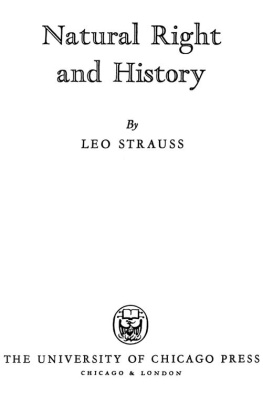

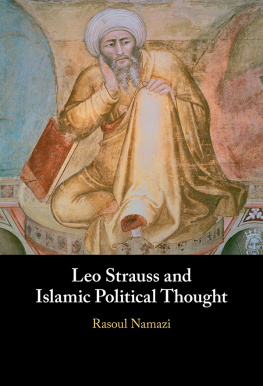
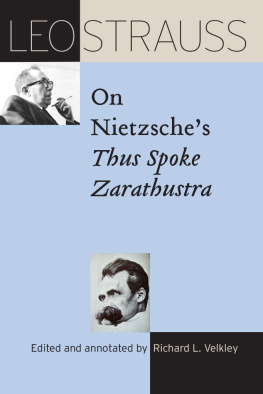
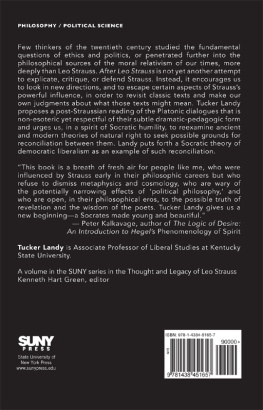

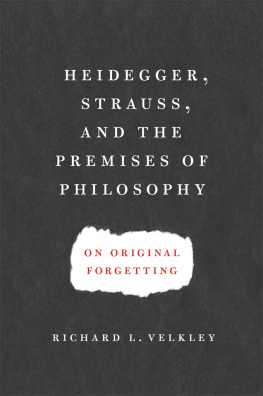
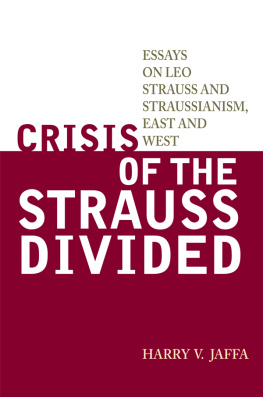
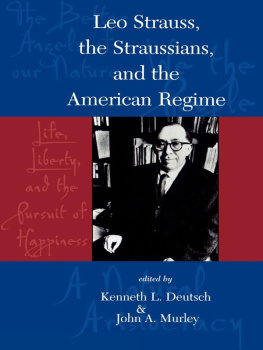
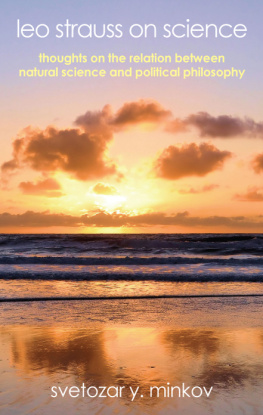
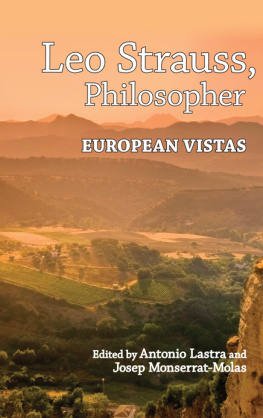
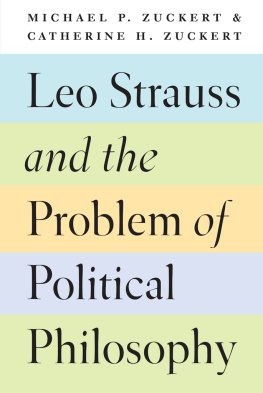
 The paper used in this publication meets the minimum requirements of the American National Standard for Information SciencesPermanence of Paper for Printed Library Materials, ANSI Z39.48-1992.
The paper used in this publication meets the minimum requirements of the American National Standard for Information SciencesPermanence of Paper for Printed Library Materials, ANSI Z39.48-1992.
